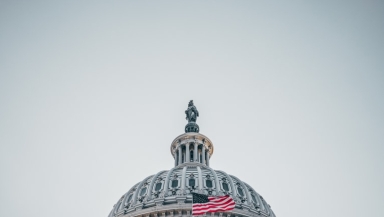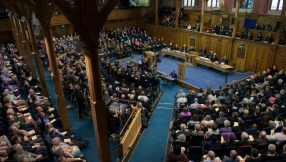
A telephonic poll by The Heartland Institute and Rasmussen Reports has given a shock to many Republicans about the views of average Democrats regarding basic rights.
Around half of Democratic voters (48 percent) believe government should be able to imprison and/or fine those who question the efficacy of vaccines, while only 27 percent of all Americans would support such infringement of free speech.
Though 58 percent of American voters would oppose government fines on the unvaccinated, 55 percent of Democrats support such measures. Disturbingly, 59 percent of Democratic voters support confining the unvaccinated to their homes at all times, while the vast majority of American voters oppose such a draconian infringement of rights.
Almost a third of Democrats (29 percent) even support removing custody of the children of the unvaccinated, and 47 percent support forced tracking devices on the unvaccinated.
Republicans, vaccinated or not, have been shocked, while Democrats generally don't see the problem. Most Americans are starting to wonder about the source of such divergent values and worldviews and the lack of understanding. This dangerous polarization has followed an increasingly steep trend with the Democratic Party becoming secularized in recent years.
First, the secularization of America is picking up steam and bringing profound change in values. A recent Pew Research Center survey showed that between 2007 and 2021, the number of Americans identifying as Christian plummeted from 78 percent to only 63 percent. During that same period, the percentage of religiously unaffiliated almost doubled from 16 percent to 29 percent.
In 2007, 58 percent of Americans prayed daily, and yet that number is now 45 percent, while those who hold religion as "very important" in their lives sank from 56 percent to 41 percent. The percent of Protestant Americans fell 10 percent in the past ten years to only 40 percent today.
These numbers seem to be increasing, as the numbers of Americans who attend religious services at least monthly fell 2 percent (33 percent to 31 percent) last year. By some estimates, around a third of Churches will be shutting down from the start of the pandemic to today.
Though alarming, this decline in Christianity is primarily a dynamic of the Democratic Party. Pew Research finds that the number of Republicans who believe in God has remained relatively consistent at 73 percent, while Democrat believers dropped to 55 percent. Republicans are double (58 percent to 28 percent) the number of Democrats who identify as Evangelical. The number of Republicans who attend church weekly is substantially higher than that of Democrats (44 percent to 29 percent).
For those who hold religion as "very important" in their lives, Republicans outnumber Democrats 61 percent to 47 percent. Most important when it comes to the connection of religiosity to worldview about rights and values, Republicans are significantly above Democrats in two key areas.
According to the Pew polls, Republicans look to religion for moral guidance over Democrats by a whopping 44 percent to 29 percent. Further, Republicans believe in absolute standards of right and wrong at over double the numbers of Democrats (47 percent to 23 percent).
Going back several decades, both parties showed comparative numbers of those who looked to religion as a source of moral guidance and believed in absolute standards of right and wrong. In the American experience, both parties generally agreed with the importance of individual rights as being from God or "endowed by our Creator" as we told King George III.
Religion provided firm moral guidance on the respect for each individual and individual rights that political majorities should not infringe. The Christian belief in original sin, and therefore the danger of corruption of power, has driven the value of limiting the power of government.
The more secularized the Democratic Party has become, the more Democrats appear willing to infringe on previously held sacred rights in deference to government power. The more faith they have placed in government (over God), the more willing Democrats have been to wield power against individual rights. Republicans generally put faith in God over government and therefore put primary value in the rights of individuals.
The way out of the polarization appears to be with the Democratic Party moving back from secularization and to the unity of values. Alternatively, the Republican Party can begin repudiating God as a source of moral guidance, but most Americans would agree that's the way to ruin.
Americans have a choice to make with our values. Is it government control over individual liberty? Does the value of the "collective" outweigh the value of individuals? Religion is at the root of the answers. For me, I stand with Joshua when he reasoned with his people about these issues and concluded: "as for me and my house, we choose the Lord."
Bill Connor, a retired Army Infantry colonel, author and Orangeburg attorney, has been deployed multiple times to the Middle East. Connor was the senior U.S. military adviser to Afghan forces in Helmand Province, where he received the Bronze Star. A Citadel graduate with a JD from USC, he is also a Distinguished Graduate of the U.S. Army War College, earning his master of strategic studies. He is the author of the book Articles from War.













